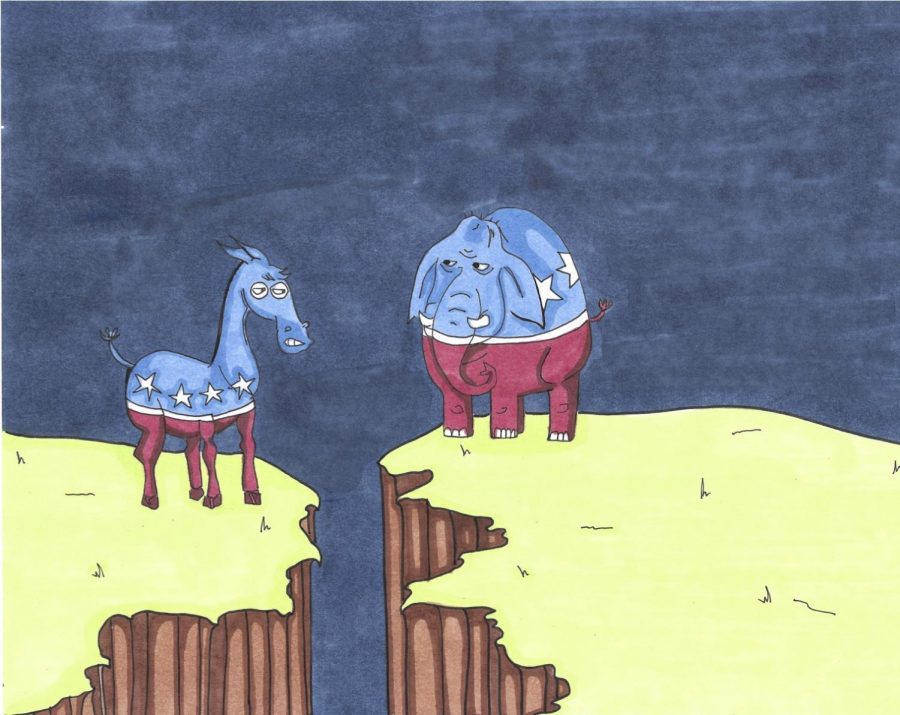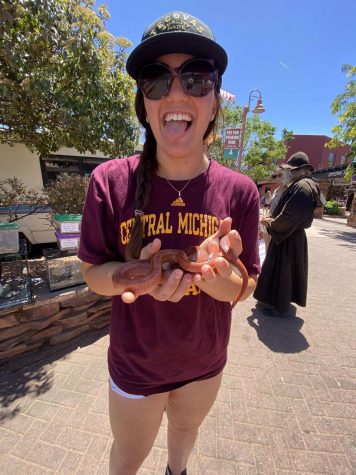Bridging the great divide
Students, teachers call for greater involvement, respect in political discourse
The belief that republican point of view is discriminated against at Desert Mountain “goes both ways,” said Young Democrats Club co-president Eli Tebeau, “There is a lot of rush back when people express themselves.” Illustrator Nora Khaled used blank paper alcohol based markers and fine-tipped pens.
November 9, 2020
“I tell you folks,” said famous American film actor Will Rogers, “all politics is applesauce”.
Politics has dominated the life of almost every American from various ages and backgrounds; many people have stopped holding back on their beliefs recently, and the passion for specific candidates and social issues have never been stronger.
During quarantine these past months, the spike of civil justice and political duels peaked. Returning to school was even a topic of high controversy and thought among district leaders, the CDC, and parents. Political debates were no stranger to the classroom before Covid-19 struck, but tensions are at an all time high.
Unfortunately, involvement is not, students say.
“Too many kids are not involved, most people have a choice at DM not to be involved, but it is important because policies directly affect everyone,” said Young Democrats Club co-president Eli Tebeau. “There is a lack of knowledge about candidates that many students are supporting”.
Whether leaning to the right or left on the political scale, students’ opinion should always matter, yet there is no point to aimlessly follow a candidate only because of political association, Tebeau said.
Many students speak of matters that they might not have a full grasp onto yet. Other students, because they live in Scottsdale, don’t care enough about the issues that affect their lives, Tebeau said.
Dani Sherman, the senior co-president of Young Democrats, said “many students don’t think it is important” to involve themselves politically.
“Yet there are others believe very strongly in their views; some don’t want to be action oriented,” she said.
This reluctance might be rooted in apparent fear among many Americans today, Sherman said., of being seen as “stupid” or “incompetent” by their peers, Sherman said.
“There might be some apprehension because of peer pressure” Sherman said. “Whichever party they might lean to, those students might be hesitant to voice their opinions if they know the majority of their classmates disagree.”
Open discourse is usually encouraged during school discussions, which allow students to learn more about their fellow classmates, and to explore their topic into more depth. Yet there has been a stark increase of politically influenced violence in the country, and even after all of this, classrooms can still have civil discussions, teachers said.
“In my class we talk about ‘civic virtue’. Students should be free to talk about their beliefs,” said Mr. Peterson, the AP U.S. History teacher at DM. By using “civic virtue” in a classroom environment, students learn civil discourse, even with disagreement, respect should remain, said Peterson, who teaches sophomores in the International Baccalaureate MYP program.
Sophomore Blake Antencio, an outspoken republican at DM, said open discourse is necessary for progress.
“Students are more open to expressing their political views in the classroom and social media platforms, and I often find myself in debates [or] discussions with other students.
He said he welcomes teacher viewpoints and invitations to discuss political topics.
“From my experience, it doesn’t affect the way students are treated,” Antencio said, adding that during this time of heightened political awareness Desert Mountain students have done a quality job of being “civil” towards one another.
“I feel safe expressing my political views,” Antencio said, “and I openly express which political figures I support in and out of school.”



